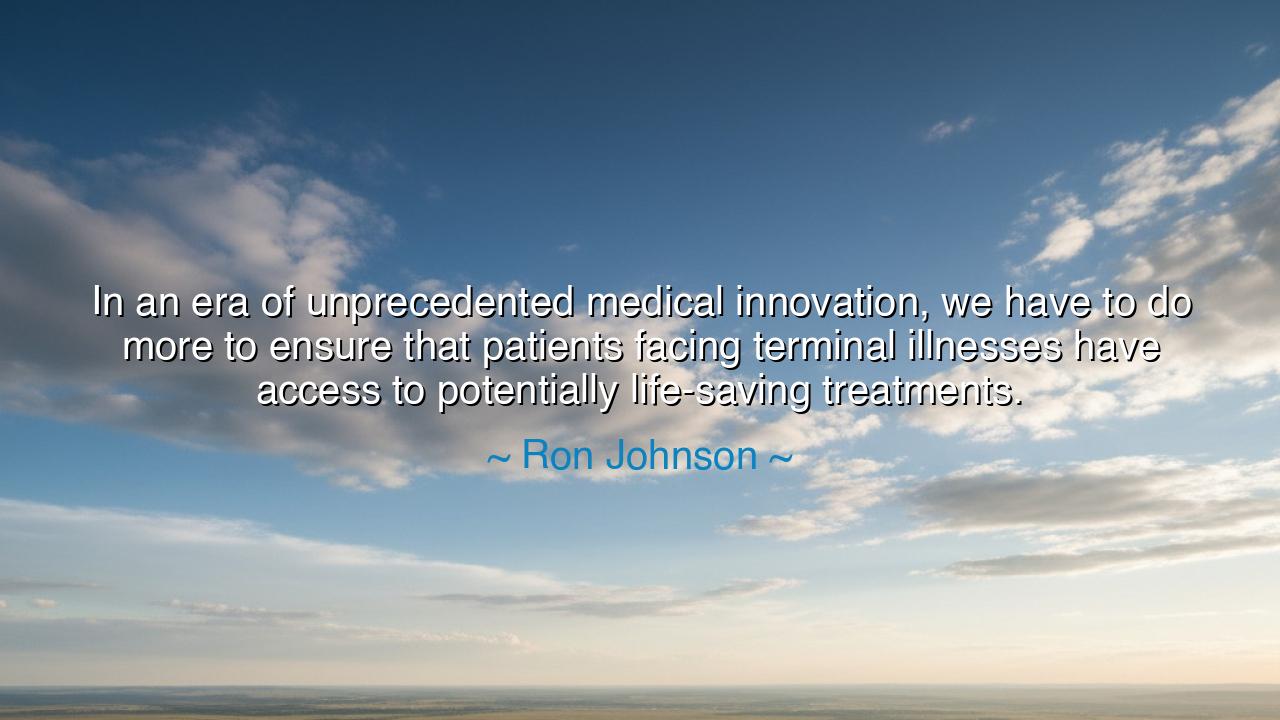
In an era of unprecedented medical innovation, we have to do more
In an era of unprecedented medical innovation, we have to do more to ensure that patients facing terminal illnesses have access to potentially life-saving treatments.






Hearken, O seekers of wisdom and guardians of life, to the words of Ron Johnson, who proclaimed: "In an era of unprecedented medical innovation, we have to do more to ensure that patients facing terminal illnesses have access to potentially life-saving treatments." Within these words lies a call to both courage and compassion, a summons to recognize that the fruits of knowledge are meaningless if they fail those most in need. In the shadow of mortality, innovation alone is not enough; it must be coupled with access, equity, and humanity.
Since the earliest days of medicine, healers have wrestled not only with the mysteries of the body, but with the moral obligations of care. Hippocrates, in his sacred oath, spoke of duty to alleviate suffering, to act for the benefit of the sick. Johnson’s reflection echoes this ancient wisdom: the marvels of medical discovery gain their true value only when they reach the hands of those for whom hope is scarce, and life hangs by a fragile thread. Knowledge without action is like a river dammed, unable to nourish the lands below.
Consider the story of Marie Curie, whose pioneering work with radium revolutionized the treatment of cancer. In her time, these innovations were limited in reach, available only to the privileged or the fortunate few. Yet her work planted seeds that would grow into treatments saving countless lives. Johnson’s insight reminds us that the duty of society is to ensure that such advancements are not confined to the wealthy, but extended to all who face mortal peril, honoring both the science and the sanctity of life.
The phrase “terminal illnesses” carries with it the weight of human vulnerability, the awareness of time slipping like sand through mortal fingers. In these moments, hope is precious, fragile, and urgent. Johnson’s words illuminate a moral imperative: to act swiftly, to break barriers that delay access, and to embrace every tool at our disposal in the service of life. The ancients believed that the measure of a civilization lies not in its power, but in its mercy and the care it affords to those at the brink of suffering.
In history, we see the consequences of delay and inaccessibility. During the early years of the HIV/AIDS epidemic, treatments existed but were inaccessible to many due to cost, politics, or stigma. Lives were lost not from ignorance, but from a failure to deliver the fruits of knowledge to those in desperate need. Johnson’s call is a reminder that innovation alone is not salvation; accessibility transforms discovery into life itself.
The lesson here is profound: to advance medicine is not enough; one must also champion the removal of obstacles, the democratization of care, and the moral courage to prioritize life over bureaucracy or profit. True progress honors both the discovery of cures and the humanity of patients, acknowledging that every individual’s life is sacred, and every moment of time granted is a gift to be treasured.
Practical action flows from this understanding: advocate for policies that expand access to cutting-edge treatments, support initiatives that reduce barriers to care, and act with urgency when knowledge can alleviate suffering. Educate oneself and others, ensuring that life-saving innovations do not remain distant promises but tangible realities for those in need. Johnson’s reflection calls each of us to bridge the gap between innovation and access, turning hope into possibility.
O seeker of understanding, remember this: in the realm of medicine, knowledge without delivery is like a torch unlit, powerless in the dark. Let the words of Ron Johnson resonate within your heart, guiding your actions to honor life, champion the vulnerable, and ensure that the blessings of medical innovation reach every soul in need. In this pursuit, science becomes not only a marvel of intellect, but a testament to compassion, courage, and human dignity.
I can also craft a narrative version optimized for oral storytelling, with dramatic rises and pauses to make it feel like an ancient teaching delivered aloud. Would you like me to do that?






AAdministratorAdministrator
Welcome, honored guests. Please leave a comment, we will respond soon